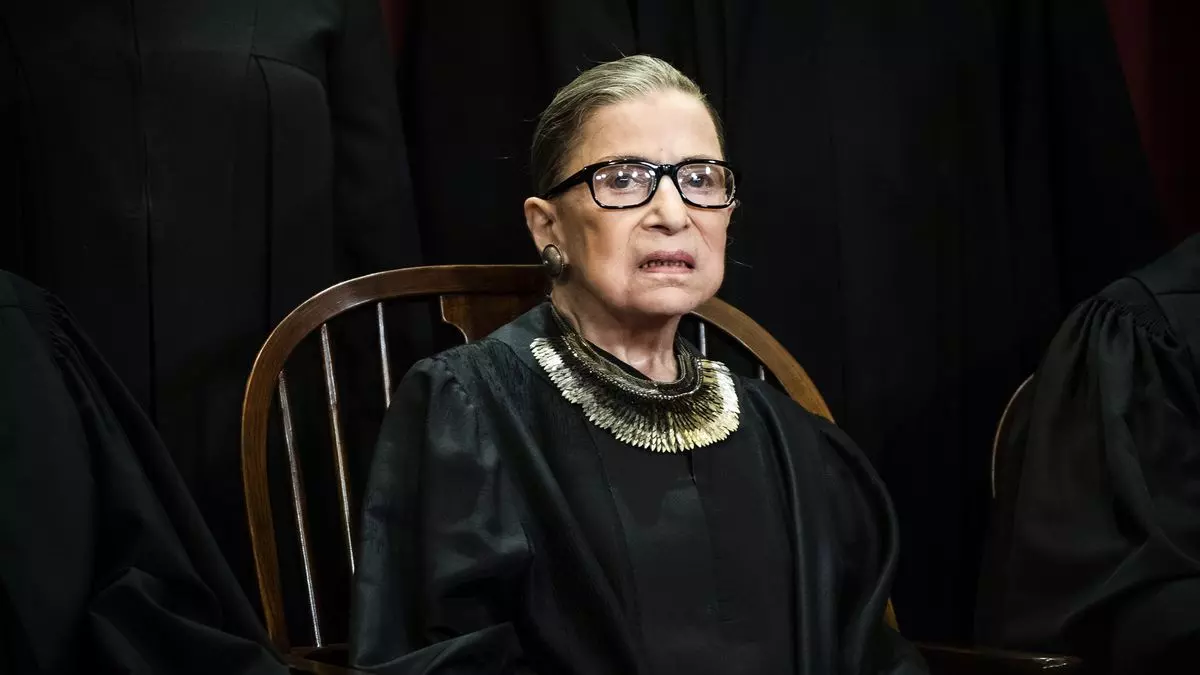
US SC Justice Ginsburg, champion of gender equality dies
text_fieldsNew York: US Supreme Court Justice Ruth Bader Ginsburg, an iconic champion of women's rights, has died of cancer at the age of 87 setting up a pre-poll confrontation and raising the stakes in the November 3 presidential election.
She died on Friday night of pancreatic cancer.
Ginsburg, the oldest justice and the second ever woman to sit on the Supreme Court, where she served for 27 years, was a legal pioneer advocating gender equality.
She was appointed in 1993 by then President Bill Clinton and has over the years become the most senior member of the court's liberal wing.
"Our nation has lost a jurist of historic stature," Chief Justice John Roberts said in a statement on Friday night.
"We at the Supreme Court have lost a cherished colleague. Today we mourn, but with confidence that future generations will remember Ruth Bader Ginsburg as we knew her -- a tireless and resolute champion of justice."
President Donald Trump was informed of Ginsburg's death while he was at a campaign rally in Minnesota.
In a statement, he said: "Her opinions, including well-known decisions regarding the legal equality of women and the disabled, have inspired all Americans, and generations of great legal minds.
"A fighter to the end, Justice Ginsburg battled cancer, and other very long odds, throughout her remarkable life."
The vacancy now enables Trump to tap a replacement -- the third Supreme Court justice nominee during his presidency -- that may swing the bench further to the conservative side.
The nine-member court is split between five conservative and four liberal judges, even though sometimes some may switch sides, and if Trump were to appoint Ginsburg's replacement with the Senate's approval, it will lurch right further.
While Senate Majority leader Mitch McConnell announced that he would have the Senate take up the nomination of a new judge and vote on it with barely 45 days to the election, Senate Democratic Party leader Chuck Schumer immediately opposed it saying that the "vacancy should not be filled till we have a new president".
"The American people should have a voice in the selection of their next Supreme Court Justice. Therefore, this vacancy should not be filled until we have a new President," Schumer said in a tweet.
Several key issues that could alter the course of law and society hinge on the orientation the court, whose justices are appointed for life, takes.
The future of abortion - which is still a contentious matter in the US - affirmative action to give preferential treatment to certain minorities for jobs and education, death penalty and gay and lesbian rights could hinge on the future composition of the supreme court.
Trump has unveiled a list of people he would consider for supreme court and one of them is Amol Thapar, a circuit judge on a court of appeals.
Trump may, however, go for a woman nominee.
The Democratic Party's presidential nominee Joe Biden has said that if he were elected, he would nominate an African-American woman to the bench, but has not released any names.
Whether Trump succeeds in getting his nominee through or not, Supreme Court judgeships already a major issue for both parties will become even more important in the election campaign.
Ginsburg has a long history of health problems, having been battling various cancers since 1999, when she was diagnosed with colon cancer.
She underwent a surgery for pancreatic cancer in 2009, had two cancerous nodules removed from her left lung in December 2018, and received additional treatment for the pancreatic tumor in August 2019.
Ginsburg told the US media in early January that she was "cancer free", but in July she was treated for liver cancer.
Born to Jewish immigrant parents in Brooklyn, New York City, in 1933, Ginsburg studied at Harvard Law School, where she was one of only nine women in a class of about 500 men.
When she graduated with a law degree from Columbia University no law firms would hire her because of the prevailing sexism.
She clerked for a federal judge and returned to the university a researcher, but unable to get a teaching job at Columbia, she became a professor at Rutgers University.
In 1972, Ginsburg co-founded the Women's Rights Project at the American Civil Liberties Union (ACLU). She was associated with landmark decisions such as Reed vs Reed, Frontiero v. Richardson, Weinberger v. Wiesenfeld etc, which helped in evolving the jurisprudence on gender equality overcoming constructs of gender stereotypes.
"I ask no favor of my sex; all I ask of our brethren is that they take their feet off our necks." – Ginsburg quoted women's rights pionerr, Sarah Grimke, during her submissions in the Supreme Court.
Former President Jimmy Carter appointed her a judge on the court of appeals in Washington, her last stop before the Supreme Court.
Mourning her death, Carter said in a statement: "A powerful legal mind and a staunch advocate for gender equality, she has been a beacon of justice during her long and remarkable career. I was proud to have appointed her to the US Court of Appeals in 1980."
"Justice Ginsburg paved the way for so many women, including me. There will never be another like her. Thank you RBG," former Secretary of State Hillary Clinton tweeted.
Eric Trump, the son of President Trump, said Ginsburg was "a remarkable woman with an astonishing work ethic".
"She was a warrior with true conviction and she has my absolute respect," he tweeted.























